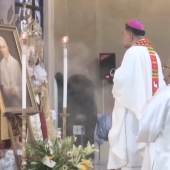Empowering Migrants: A call to action for justice and dignity in India

The Conference of Catholic Bishops of India (CCBI) Commission for Migrants, North Region, organized a one-day seminar titled "Empowering Migrants" on August 12 at the DCC Hall, Archbishop's House, New Delhi.
The seminar focused on protecting the human dignity and labor rights of migrants, bringing together key voices from labor and social justice sectors to address the challenges faced by migrant workers in the region and explore potential solutions through dialogue and collaboration.
The event saw the participation of 65 individuals, including commission secretaries from the dioceses of Delhi, Jalandhar, Jammu-Srinagar, and Shimla-Chandigarh, representatives from dioceses, religious congregations, NGOs, the Catholic refugee community, and internally displaced persons.
In his inaugural address, Archbishop Anil Couto emphasized the importance of solidarity and collective action in improving the lives of migrant workers.
He stressed the need for collaboration among different stakeholders to advocate for policies that protect the rights and dignity of migrants.
"This seminar is a crucial step towards understanding and addressing the issues faced by migrant workers in our region," Archbishop Couto stated, urging participants to work together to create a more inclusive society where migrant workers are valued and respected.
Dr. Amarjeet Kaur, National General Secretary of the All India Trade Union Congress (AITUC), delivered a powerful keynote speech highlighting the harsh realities faced by unorganized workers in India, particularly the youth.
She warned that rising unemployment and deepening poverty could lead to greater social unrest and inequality if not addressed.
Dr. Kaur called for a comprehensive policy framework to uplift unorganized workers and migrants, emphasizing the need for equal opportunities and the importance of strengthening the labor movement in India.
Fr. Jaison Vadassery, Executive Secretary of the CCBI Commission for Migrants, introduced the CCBI Mission 2033—a forward-looking pastoral plan aligned with the Catholic Church's broader mission of synodality.
This plan, developed with the Jubilee Year 2033 in mind, focuses on supporting migrants and unorganized workers, recognizing their struggles as central to the Church's mission to promote justice, dignity, and human rights.
Fr. Vadassery explained that Mission 2033 aims to address the long-term spiritual and social needs of migrants, encouraging dioceses across India to actively participate in this holistic mission.
The seminar concluded with a collaborative session moderated by Mr. Nirmal Gorana of the National Campaign Committee for the Eradication of Bonded Labour (NCCEBL). Participants discussed and developed a concrete action plan, focusing on four key areas:
-
Policy Advocacy: Advocating for stronger national policies to protect migrant workers' rights and ensure the full implementation of the E-shram portal.
-
Strengthening Networks: Building stronger connections among dioceses and national organizations to better support and coordinate efforts for migrant workers.
-
Awareness and Education: Enhancing efforts to educate workers about their rights and available resources, with a focus on rural and remote areas.
-
Spiritual and Mental Well-being: Providing pastoral care and psychological support to address the mental and spiritual challenges faced by migrants.
Participants were deeply engaged, contributing valuable perspectives and insights. The seminar marked a significant step forward in the ongoing effort to ensure that society's most vulnerable members are supported and uplifted through both policy and pastoral care. Plans were made to reconvene in the future to review progress and refine strategies.
The seminar also included heartrending testimonies from participants, including those from Manipur and Burmese refugees. Their stories added a profound emotional dimension to the discussions, underscoring the urgent need for collective action to support these vulnerable communities.
Radio Veritas Asia (RVA), a media platform of the Catholic Church, aims to share Christ. RVA started in 1969 as a continental Catholic radio station to serve Asian countries in their respective local language, thus earning the tag “the Voice of Asian Christianity.” Responding to the emerging context, RVA embraced media platforms to connect with the global Asian audience via its 21 language websites and various social media platforms.














